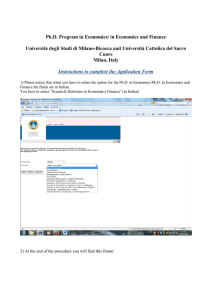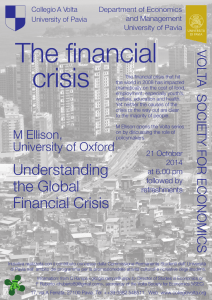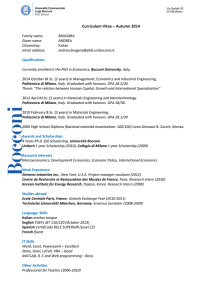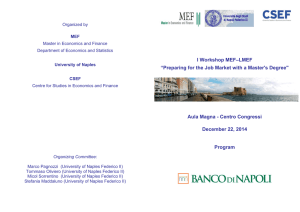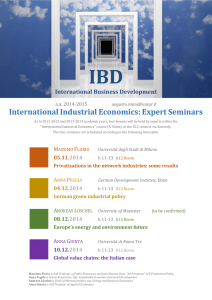Curriculum vitae - Università degli Studi di Trento
advertisement
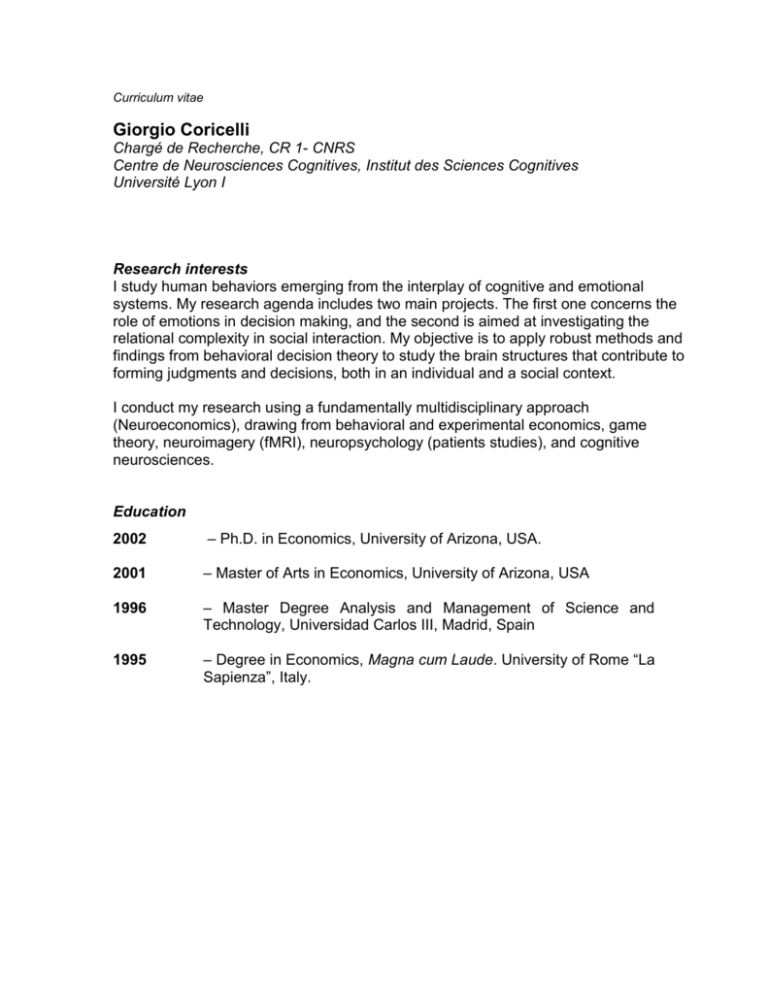
Curriculum vitae Giorgio Coricelli Chargé de Recherche, CR 1- CNRS Centre de Neurosciences Cognitives, Institut des Sciences Cognitives Université Lyon I Research interests I study human behaviors emerging from the interplay of cognitive and emotional systems. My research agenda includes two main projects. The first one concerns the role of emotions in decision making, and the second is aimed at investigating the relational complexity in social interaction. My objective is to apply robust methods and findings from behavioral decision theory to study the brain structures that contribute to forming judgments and decisions, both in an individual and a social context. I conduct my research using a fundamentally multidisciplinary approach (Neuroeconomics), drawing from behavioral and experimental economics, game theory, neuroimagery (fMRI), neuropsychology (patients studies), and cognitive neurosciences. Education 2002 – Ph.D. in Economics, University of Arizona, USA. 2001 – Master of Arts in Economics, University of Arizona, USA 1996 – Master Degree Analysis and Management of Science and Technology, Universidad Carlos III, Madrid, Spain 1995 – Degree in Economics, Magna cum Laude. University of Rome “La Sapienza”, Italy. Work experience 2004-present – Research scientist (Chargé de Recherche, CR 1-CNRS, Institut des Sciences Cognitives, Lyon 2008-present – Visiting scholar, CIMeC, University of Trento, Trento, Italy 2007 – Visiting scholar, California Institute of Technology (Caltech). Pasadena, CA, USA 2003 – Chercheur associe estranger, CNRS Institut des Sciences Cognitives, Lyon 2002 – Post-doctoral research fellow. Department of Economics, University of Siena – Visiting research fellow at the Max Planck Institute for Research into Economic Systems. Strategic Interaction Group. Jena, Germany 2001 – Research fellow at the Centre for Experimental Economics (EXEC), Department of Economics and Related Studies, University of York, UK 1999-2002 – Research assistant, Economic Science Laboratory, University of Arizona, Tucson, USA 1997-1998 – Visiting Pre-Doctoral Fellow, Economic Science Laboratory (ESL), University of Arizona, Tucson. Advisor: Vernon L. Smith 1997 – Research fellow at ISPE (Istituto di Studi per la Programmazione Economica), Rome. Public Policy Department, Microsimulation Unit Teaching experience Courses taught: Experimental Economics, ESL University of Arizona, 2000 Game Theory and Experimental Economics, Doctoral program in economics, University of Siena, 2001 Theory of Mind and Autism, University of Arizona, 2001 Econ201B, Macroeconomics. Spring 2001, University of Arizona Statistical Economics, University of Siena, 2002-2003 Experimental Economics, University of Lyon 2, France, 2004 2 Neuroeconomics, Doctoral program cognitive sciences, University of Siena, 2005 Introduction to Neuroeconomics, Doctoral program in Economics and Complexity, University of Torino, 2006-2007 Introduction to Neuroeconomics, SISSA, Trieste, 2006 Brain and decision making, Doctoral program in Behavioral Economics, University of Trento, 2006-2007 The neural basis of decision making. Graduate course. University Claude Bernard, Lyon I, 2007-2008. Neuroeconomics, Doctoral program in Economics and Complexity, University of Torino, 2008 PUBLICATIONS 1. Coricelli, G., McCabe, K.A. and Smith V.L. (2000). “Theory-of-Mind Mechanism in Personal Exchange”. Affective Minds. Elsevier Science Publishers, pp. 249-259. 2. Coricelli, G., and Luini, L. (2003). “Double Moral Hazard: an Experiment on Warranties”. Economia impresa e mercati finanziari, N.2, October, pp. 7-25. 3. Camille, N., Coricelli, G., Sallet, J., Pradat, P., Duhamel, JR, and Sirigu, A. (2004). “The involvement of the orbitofrontal cortex in the experience of regret”. Science, Vol. 304, Issue 5674, 21 May 2004, pp. 1167-1170. 4. Coricelli, G., Fehr, D., and Fellner, G. (2004). “Partner selection in public goods experiments”. Journal of Conflict Resolution. Vol. 48 N 3, June 2004, pp. 356-378. 5. Coricelli, G. (2004). “How the Brain Evaluates and Predicts Monetary Rewards”. Homo Oeconomicus 21: 509-520. 6. Coricelli, G. (2004). “Reciprocity-based emotions: An experimental study.” Rivista Internazionale di Scienze Sociali. pp. 359-379. 7. Coricelli, G., (2005). “Two-levels of mental states attribution: from automaticity to voluntariness”. Neuropsychologia, 43, pp. 294-300. 8. Coricelli, G., Camille, N., Pradat-Diehl, P, Duhamel, JR, Sirigu, A. (2005). “Why anticipated regret influences subjects’ choice”; Science, 308, pp. 1260-1261. 9. Coricelli, G., Critchley, H.D., Joffily, M., O’Doherty, J.D., Sirigu, A., and Dolan, R.J. (2005). “Regret and its Avoidance: A Neuroimaging Study of Choice Behavior” Nature Neuroscience, 8, pp. 1255 - 1262. 3 10. Coricelli, G., Gonzales-Morales, L. and Mahlstedt, A. (2006). “The investment game with asymmetric information”. Metroeconomica, 57:1, pp. 13-30. 11. Büchner, S., Coricelli, G., and Greiner, B. (2007) “Self-centered and otherregarding behavior in the Solidarity game”. Journal of Economic Behavior and Organization, 62: 2, pp. 293-303. 12. Giardini, F., Coricelli, G., Joffily, M., Sirigu, A. (2007). “The effect of desirability on confidence”. In: Abdellaboui, M., Hey J.D. (Eds.) Advances in Decision Making under Risk and Uncertainty. Heidelberg: Springer. 13. Coricelli, G., Dolan, R.J., Sirigu, A. (2007). Brain, emotion and decision making: the paradigmatic example of regret. TRENDS in Cognitive Sciences. Vol.11, 6, June 2007, pp. 258-265.. 14. Ambrosino, A., Bault, N., Coricelli, G. (2008, forthcoming). Neural basis of emotional aspects of economic decision making. Revue d'économie politique. 15. Coricelli, G. (2008, forthcoming). The potential role of regret in the physicianpatient relationship: insights from neuroeconomics. In Hauser and McCabe (Eds.) Advances in Health Economics and Health Services Research. Elsevier. In Italian Coricelli, G., Schwarzbach, J. Cervello e decisioni (2008, forthcoming). In Bonini, N., Del Missier, F. e Rumiati R. (Eds.) Giudizio e Decisione. Laterza Editore. Papers under revision 1. “Interdependent utilities: How social ranking affects choice behavior” With Nadége Bault and Aldo Rustichini 2. “Impaired decision-making in schizophrenia and orbitofrontal cortex patients: a comparative study”. With Marion Larquet and Florence Thibaut 3. “Tax evasion: Cheating rationally or deciding emotionally?” with Mateus Joffily, Claude Montmarquette, and Marie-Claire Villeval 4. “Strategic interactions in iterated zero-sum games”. 4 5. “Reward biases people’s self-confidence”. With Giardini, F., Joffily, M., Sirigu A. 6. “Beauty contest in the brain: the neural basis of strategic thinking”. With Rosemarie Nagel. Work in progress 1. “The interaction of private and social, personal and external responsibility”. with Jaroslaw Grygolec, and Aldo Rustichini. (manuscript ready for submission) 2. “The neural basis of pro-social behavior: A neuropsychological study”. With Angela Sirigu and Mateus Joffily (manuscript in preparation). 3. “Pathological gambling phenomenon in Parkinson disease after L-dopa therapy” (collecting data, finalizing the analysis). 4. “Neuronal Basis of Empathy, Altruistic Reward and Punishment in Third-Party Social Exchange.” With Tania Singer, Aldo Rustichini, Ray Dolan (finalizing the analysis of the fMRI data). 5. Neuroanatomical dissociation between regret and envy. With Nadege Bault, Mateus Joffily, Florence Thibaut, Angela Sirigu, Aldo Rustichini. (collecting data, finalizing the analysis). 6. Choice with regret and Envy: an fMRI study. With Nadege Bault and Aldo Rustichini. (finalizing the analysis). Invited Lectures “Theory of Mind Mechanism in Personal Exchange.” Department of Economics, University of Siena, November 2000 “Strategic Interaction in Iterated Zero-sum Games.” Max Planck Institute for Research into Economic Systems, Jena, Germany, November 2001 “Multi-level Contests: Within Group Conflict and Between Groups Competition.” Max Planck Institute, Jena, Germany, December 2002 5 “Theorie de l’Esprit et Psycholpathologie”. Colloque des Confrontations Psychiatriques. Lyon, September 26, 2003 “The emotions of regret and disappointment”. University of Tilburg, Holland, October 2003 “Endogenous partner selection in public goods experiments.” Groupe d'Analyse et de Théorie Economique (GATE) CNRS - Lyon, October 13, 2003 “The role of ventromedian cortex in experiencing regret.” Workshop on Modelling of Prefrontal Function. Trieste, Italy, 15-18 October 2003 “How the brain evaluates and predicts monetary rewards.” 6th Workshop in Applied Game Theory: The Brain, Rationality, and Economics. University of Hamburg, December 2003 “How the brain processes the consequence of our choice”. Third Tilburg Symposium on Psychology and Economics: Games and Decisions. Tilburg, Holland, 1 September 2004. “How the brain processes the consequences of our choice”. Advances in Neuroeconomics. University of Siena, Itlay June 21, 2005. “The neural basis of individual and social decision making”. University Pompeu Fabra, Barcelona, Spain, 13 July, 2005. "How would have been better if I had chosen differently : Learning to avoid intense negative emotions”. Groupe d'Analyse et de Théorie Economique (GATE) CNRS. Lyon, November 7, 2005. “Brain and decision making”. 15ème Journée de Neuropsychologie Jean-Louis Signoret. Hôpital de la Salpêtrière. Paris, October 24, 2005. “Brain and decision-making: learning to avoid intense negative emotions”. TWENTY-FOURTH EUROPEAN WORKSHOP ON COGNITIVE NEUROPSYCHOLOGY. Bressanone, January 2006. "The influence of high-level emotions on decision making: An fMRI study". University of Trento, Rovereto, April 3, 2006. “The role of the Orbitofrontal cortex in decision making”. University of Verona, Department of Neurology, May 31, 2006. “The neural and theoretical basis of regret as an adaptive emotion“. Workshop on Neuroeconomics. University of Florence, November 17, 2006. 6 “Neural basis of emotional aspects of ‘Economic decision making’”. Université Paris I, Panthéon Sorbonne, Institut Nicod, Paris, December 1, 2006. “Brain and decision making: A multidisciplinary approach for A multidisciplinary approach for understanding individual and social behavior”. FENS/Hertie WINTER SCHOOL 2006, Brain Basis of Social Interaction: From Concepts to Imaging. “Bases neuronales de la toma de decisions.” V Simposio de Neurosciencias FLENI. 9-12 May 2007. “Neuroeconomia.” V Simposio de Neurosciencias FLENI. 9-12 May 2007. “Interdependent utilities: How social ranking affects choice behavior”, EWEBE 2, Lyon, 7-8 December 2007. Honors and Awards B.A. with Laude, 1995 Graduate assistantship from the University Carlos III, Madrid, 1995-96 Fellowship from the University of Rome “La Sapienza” 1997-98 Fellow, Economics Science Laboratory Graduate Student Workshop, summer, 1997 George Coleman Award for the 1999-2000 academic years USA Graduate assistantship (research and teaching assistant) from the University of Arizona, 1998-2002 Prix Découvertes 2004 : Comment éprouver du regret influence nos décisions. From the French Ministry of Research. Fellow of the Summer institute of Cognitive Neurosciences. Directed by Michael Gazzaniga. University of California Santa Barbara, CA, USA. June-July 2007. Research Grants Grant from the Economic Science Laboratory, University of Arizona, 20012002 National Science Foundation (grant number SES9818561) Grant from EU-TMR Research Network ENDEAR, 2001-2002 Human Frontier Science Program - HFSP. Title of the project: “Decision making and strategies in the brain: a multidisciplinary approach for understanding social behaviour”. 2004-2007. Principal invstigator : “Systemes complexes en SHS”, Grant from CNRS and Ministere de la Recherche, 2003-2004. Title of the project: “Relational Complexity”. 48,000 Euros. 7 Principal investigator : ANR (Agence Nationale de la Recherche). Title of the project: : “SocialBrain“. 2007-2010. 150,000 Euros. Principal investigator: PAT (Provincia Autonoma di Trento) research grant. Title: Neuroeconomics. 2007-2010. 385,000 Euros. Media “Les bones raisons d’avoir des regret“, Cerveau & Psycho “Le rôle du regret dans la prise de décision mesure par des neurologues“. LE MONDE. “Nella testa di chi non conosce il rimpianto“. IL CORRIERE DELLA SERA. “Il rimpianto è l'anima del commercio”. La REPUBBLICA “Vital signs : Winning, losing and regretting“. THE NEW YOURK TIME “Brain region tied to regret identified“. SCIENTIFIC AMERICAN. “Pinpointing regret in the brain”. NEW SCIENTIST. “Where regret roots in the brain“. FOX NEWS. “Estudian cómo el cerebro elige gastar o invertir”. Clarin. “Neuroeconomie”. Le Monde. Radio and TV: RAI Radio 3 Science, Italy. France 2 Professional affiliations Institut des Sciences Cogntives, CNRS, Bron, France Université Lyon I CIMeC, University of Trento, Italy Laboratorio di Economia Sperimentale, Università di Siena (LabSi) EXEC University of York, UK, 2001-2002 Cognition and Neuroimaging Laboratories University of Arizona, 19992002 Economic Science Laboratory, University of Arizona, 1998-2002 International collaborations Aldo Rustichini, University of Minnesota, USA Colin Camerer, Caltech, USA Raymond Dolan, UCL, FIL, London, UK Rosemarie Nagel, U. Pompeu Fabra Marie-Claire Villeval, GATE-CNRS, France 8 Tutorial activity Francesca Giardini, Doctoral program in Cognitive Science, University of Siena Nadége Bault, Second year PhD student, University Lyon 1 Chiara Chelini, Second year PhD student, University of Torino Elissar Andari, First year Ph.D student, University Lyon 1 Brice Le Stunff, Master 1, University Lyon 2 9
